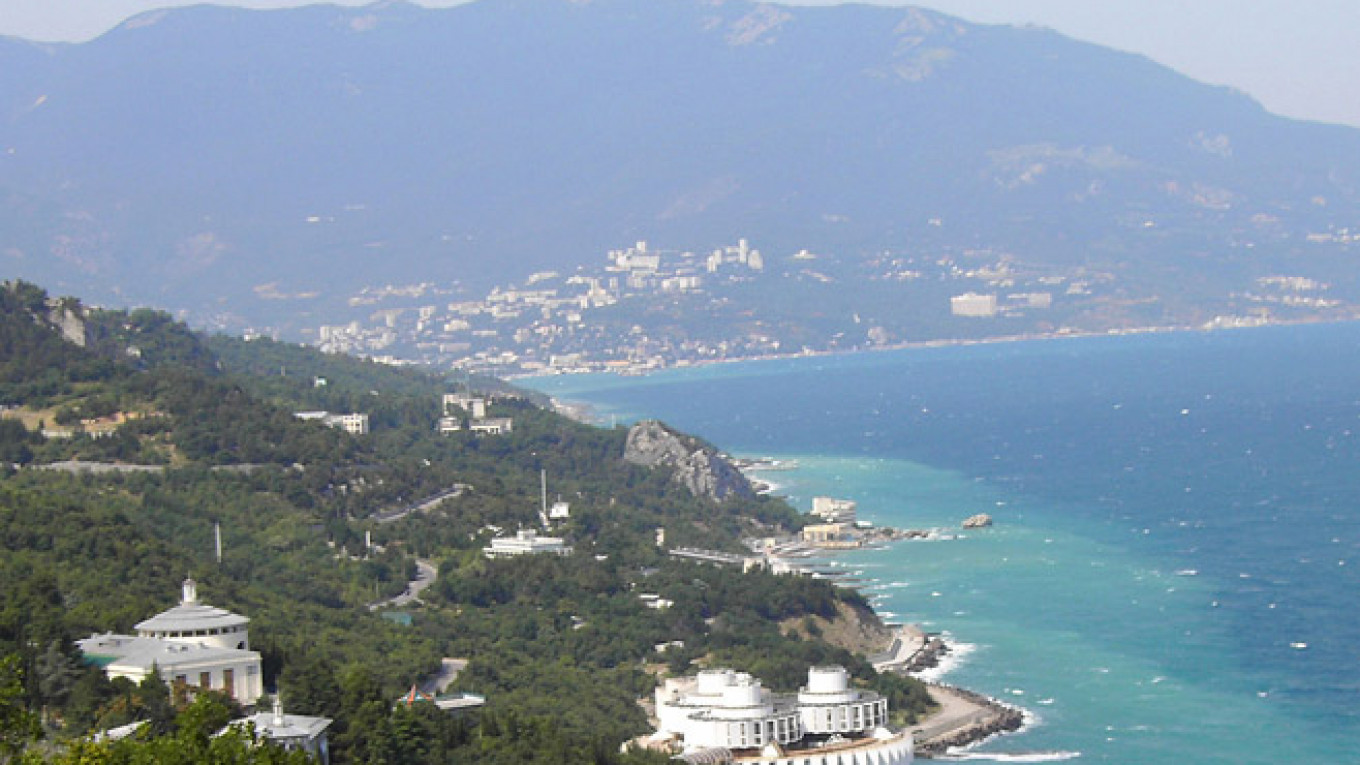Under the weight of the latest round of European Union sanctions, the contested territory of Crimea will become an even greater burden to the beleaguered Russian budget than had been expected.
The EU on Wednesday imposed new sanctions directed specifically at Crimea, banning European investors from participating in infrastructure, telecommunications, transport, energy, as well as hydrocarbon and minerals extraction projects in the region.
Following the decision, Russian officials on Thursday presented soaring new estimates on how much money will be required over the next six years to support the territory, which Russia annexed from Ukraine in March to international condemnation.
Oleg Savelyev, head of the recently created Crimean Development Ministry, said Thursday that 658 billion rubles ($18.4 billion) will be needed through 2020 to develop Crimea's infrastructure, Interfax reported.
Almost a third of that vast sum, or 247 billion rubles ($6.9 billion), must be channeled to building a bridge across the Kerch Strait, creating the first direct road and rail connection with Russia's mainland there, Savelyev said, speaking at a meeting with Deputy Prime Minister Dmitry Kozak.
Contradicting earlier reports, Kozak said that the bridge, which will be the most expensive one ever built in Russia, is now to be funded on state money alone. Construction is scheduled to begin later this year, he added.
Previously, government officials had said that private investors might participate in the project through a public-private partnership scheme. Return on investment could have come from tolls levied for passage across the bridge, but officials were divided on whether a charge should apply as there is currently no free alternative for crossing the strait.
Attracting private investors to other infrastructure projects, be they foreign or domestic, will now be more difficult following the sanctions, which have limited the funding options and international business prospects of Crimean ventures. The state will now be left with the option of either opening up its own coffers even wider or luring Russian investors with generous benefits.
In an interview with Vedomosti published Wednesday — evidently made before the new wave of sanctions arrived — Savelyev insisted that American and European investors' interest in Crimea was still strong.
"The investments that have begun are continuing. We are discussing new projects," Savelyev said, although he was reluctant to specify further or provide the names of companies involved.
However, it was clear that the main origin of capital flow to the region would come from Russia even after the first wave of sanctions hit Crimea, according to Alexander Deryugin, director of the Center for Regional Reform Studies at the Russian Presidential Academy of National Economy and Public Administration.
Early on, there was "a trace" of Chinese interest in building port infrastructure, he said. Now, even those investors will be loath to touch Crimean projects, making it less likely that the region will thrive on an influx of foreign capital, he said.
"Although not bound by sanctions, investors from China face a possibility that they will have difficulties with their other international projects after they have invested in Crimea," Deryugin said.
Russia is trying to draw investors to the region by offering substantial benefits for working there. Plans are now under way to turn the territory into an offshore zone like the one in Cyprus, where businesses would enjoy a reduced tax burden and a particularly lenient legal system.
Earlier this week, the Crimean Development Ministry submitted a bill to the Cabinet that, if passed into law, will help establish such a zone in Crimea by allowing Russian businesses to work under foreign law in its jurisdiction.
But even these conditions may not be enough to draw domestic investors. "The general conditions offered under the proposal of this offshore zone are attractive, but still the sanctions have generated a great level of risk even for Russian companies because they too would face problems when working abroad after being exposed in Crimea," Deryugin said.
"The government can still pressure them to invest in Crimea, but that all depends on to what extent they employ the carrot-and-stick approach," he said.
See also:
Crimean Winemakers Lobby Putin for EU Alcohol Ban
Contact the author at [email protected]
A Message from The Moscow Times:
Dear readers,
We are facing unprecedented challenges. Russia's Prosecutor General's Office has designated The Moscow Times as an "undesirable" organization, criminalizing our work and putting our staff at risk of prosecution. This follows our earlier unjust labeling as a "foreign agent."
These actions are direct attempts to silence independent journalism in Russia. The authorities claim our work "discredits the decisions of the Russian leadership." We see things differently: we strive to provide accurate, unbiased reporting on Russia.
We, the journalists of The Moscow Times, refuse to be silenced. But to continue our work, we need your help.
Your support, no matter how small, makes a world of difference. If you can, please support us monthly starting from just $2. It's quick to set up, and every contribution makes a significant impact.
By supporting The Moscow Times, you're defending open, independent journalism in the face of repression. Thank you for standing with us.
Remind me later.






